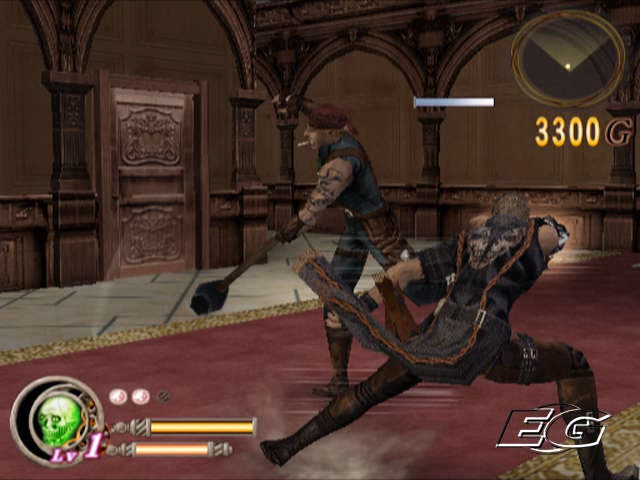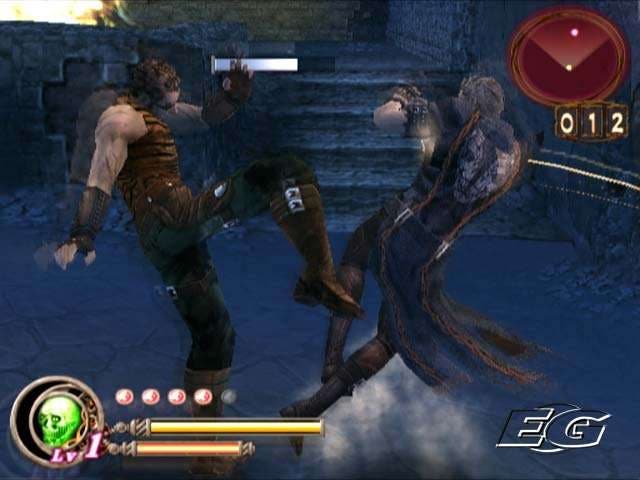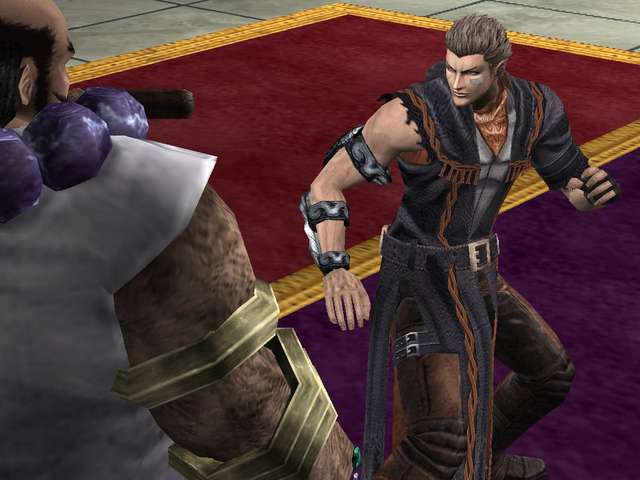God Hand
Hand's dealt. Do you play it?
You've got to love the games that know they're games. Take Urban Chaos: Riot Response last year. It knew what people play FPSes for, stripped away the pretensions of the genre and gave us set pieces where we threw meat cleavers into a man's face, in slow motion, while he was on fire, until he collided with a gas canister and exploded. With God Hand, Clover has performed a similar feat of removing the pole from the arse of a genre, giving us a third-person brawler that lets us kick gorillas into space. Awesome! But unlike Riot Response, God Hand is very, very clever underneath the idiocy. Brilliant!
Anything you've heard about God Hand is probably true. Kicks to the balls are kind of a feature, as are poison chihuahuas, spankings and endless trash talking. Sinister punk-looking men will even occasionally throw their mohawks at you, fighting on as baldies before their hair grows back with a flash. It's funny stuff, and God Hand makes sure you know you're meant to be laughing at it by distancing you from it. The game has an invisible studio audience that cheer or boo when you do well or screw up, and they laugh whenever anyone takes a shot to the sack. Protagonist Jean acts just like we do, too. He's always grinning like an idiot, spoiling for the next fight and eagerly responds to the over-the-top speeches of bosses with such killer lines as "...like I give a shit!"

But all that's not the reason it gets a high score. That's just why it's a little more interesting than its po-faced hyperviolent competition. It gets a high score because it's a fighting game with really good fighting. It doesn't try and distract you from the game itself with level design, plot or the drip-feeding of abilities - God Hand's stages are cavernous arenas where the fighting happens. The fighting is fair, and it's deep, and it's really hard, and that's all that's needed to engage you.
And by really hard we mean really, really hard. Don't let the jovial tone fool you, this is a game than wants to take you to the cleaners. You're far more fragile than the enemies that come at you and going one-on-one against a weakling is sometimes even worse than a group because you tend to let your guard down and make stupid mistakes. Plus God Hand's retro style means it's crawling with bosses, and defeating a foe will randomly turn the sky black, stop the music and spawn a leather-tough demon who will unquestionably wipe the floor with you on your first encounter. There's no EXPLANATION for this, the game just wants to hurt you.

How does all this fighting work? From an offensive point of view, God Hand is crowd control. Getting close to an enemy and staying there is the most efficient way to deal damage to him, but it'll also let his friends take advantage of the Resi 4 over-the-shoulder camera and hit you from the sides, letting him return fire too. To cause some hurtin' you need to temporarily get people off your back by working in the moves with the longer windups, ones that knock enemies across the room, up in the air, down to the ground or just leave them reeling, then get to work on anyone still standing. You've also got an array of over the top "Roulette" attacks where selecting the right move is a game in itself, and then there's the strength and speed boost of God Hand mode which is traditionally activated during fits of rage when the game's just made you look like a tool. But both of these are precious, limited resources that require careful usage.
From a defensive point of view, it's about tactical positioning and keeping a mental picture of your surroundings to ensure you're always looking at any threats. Every attack that comes your way is pre-empted by something, from the audible comedy arm-windmilling of the game's fodder to the insanely fast moves of your counterpart, Devil Hand. But this isn't a game that'd let you do something as boring as hold down a button to block, oh no. Tapping the right analog stick to the back or sides makes Jean perform a quick back handspring or sidestep, and he's invulnerable for the duration. You need to watch the move come in and time your dodge right. Tap forward on the stick and you weave on the spot, but that'll only evade moves with small windups and... well, that's where things get interesting.

See, God Hand has a dynamic difficulty in the form of levels. Perform risky standing dodges, taunt enemies, perform huge combos and so on and your level meter creeps up. Go up a level, the crowd cheers and the enemy AI gets noticeably meaner. Getting through levels never stops being a struggle because conservative play will eventually level you up even if you don't want it, resulting in a whipping that'll take your meter back down. It's here more than anywhere else you feel like the game's out to get you (the levels are called 1, 2, 3 and DIE), but it's worth being the best you can be anyway because at higher levels enemies drop more cash to be spent on the 100+ techniques or stat upgrades, or idly wasted at the Chihuahua races or casino.
There are problems, of course. Initially all the attacks that come in from off camera or that interrupt your slow moves feel as unfair and low as the ball-busting kicks you frequently employ, then at the end when the difficulty really ramps up cracks in the control system start showing and you start cursing the clumsy running and cheap tricks you have to resort to. But the plateau in between is long and it's really, really good gaming, assuming you don't let the game push you around like a playful big brother with little a superiority complex. God Hand just wants to have fun. And so do we.



